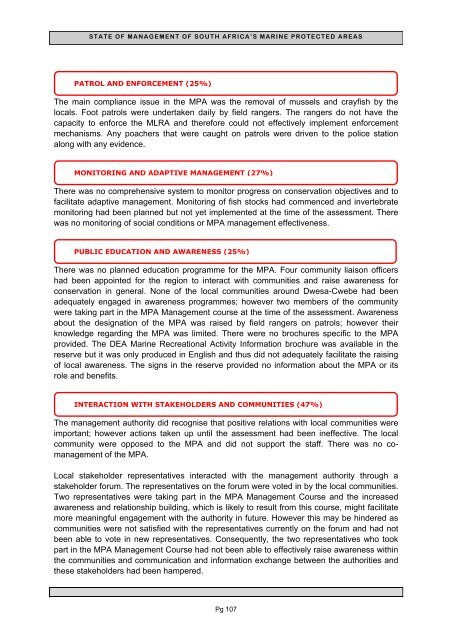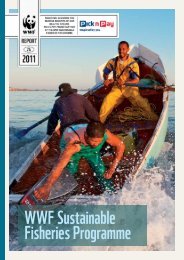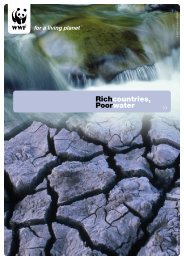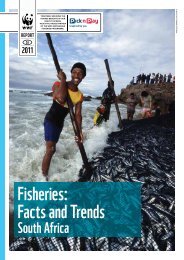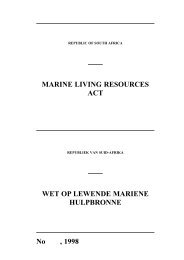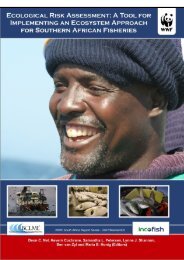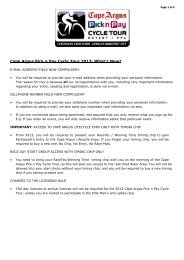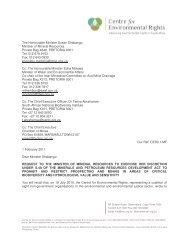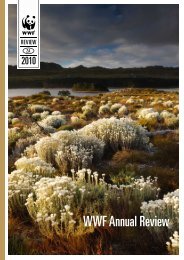State of Management of South Africaââ¬â¢s ... - WWF South Africa
State of Management of South Africaââ¬â¢s ... - WWF South Africa
State of Management of South Africaââ¬â¢s ... - WWF South Africa
- No tags were found...
You also want an ePaper? Increase the reach of your titles
YUMPU automatically turns print PDFs into web optimized ePapers that Google loves.
STATE OF MANAGEMENT OF SOUTH AFRICA’S MARINE PROTECTED AREASPATROL AND ENFORCEMENT (25%)The main compliance issue in the MPA was the removal <strong>of</strong> mussels and crayfish by thelocals. Foot patrols were undertaken daily by field rangers. The rangers do not have thecapacity to enforce the MLRA and therefore could not effectively implement enforcementmechanisms. Any poachers that were caught on patrols were driven to the police stationalong with any evidence.MONITORING AND ADAPTIVE MANAGEMENT (27%)There was no comprehensive system to monitor progress on conservation objectives and t<strong>of</strong>acilitate adaptive management. Monitoring <strong>of</strong> fish stocks had commenced and invertebratemonitoring had been planned but not yet implemented at the time <strong>of</strong> the assessment. Therewas no monitoring <strong>of</strong> social conditions or MPA management effectiveness.PUBLIC EDUCATION AND AWARENESS (25%)There was no planned education programme for the MPA. Four community liaison <strong>of</strong>ficershad been appointed for the region to interact with communities and raise awareness forconservation in general. None <strong>of</strong> the local communities around Dwesa-Cwebe had beenadequately engaged in awareness programmes; however two members <strong>of</strong> the communitywere taking part in the MPA <strong>Management</strong> course at the time <strong>of</strong> the assessment. Awarenessabout the designation <strong>of</strong> the MPA was raised by field rangers on patrols; however theirknowledge regarding the MPA was limited. There were no brochures specific to the MPAprovided. The DEA Marine Recreational Activity Information brochure was available in thereserve but it was only produced in English and thus did not adequately facilitate the raising<strong>of</strong> local awareness. The signs in the reserve provided no information about the MPA or itsrole and benefits.INTERACTION WITH STAKEHOLDERS AND COMMUNITIES (47%)The management authority did recognise that positive relations with local communities wereimportant; however actions taken up until the assessment had been ineffective. The localcommunity were opposed to the MPA and did not support the staff. There was no comanagement<strong>of</strong> the MPA.Local stakeholder representatives interacted with the management authority through astakeholder forum. The representatives on the forum were voted in by the local communities.Two representatives were taking part in the MPA <strong>Management</strong> Course and the increasedawareness and relationship building, which is likely to result from this course, might facilitatemore meaningful engagement with the authority in future. However this may be hindered ascommunities were not satisfied with the representatives currently on the forum and had notbeen able to vote in new representatives. Consequently, the two representatives who tookpart in the MPA <strong>Management</strong> Course had not been able to effectively raise awareness withinthe communities and communication and information exchange between the authorities andthese stakeholders had been hampered.Pg 107


